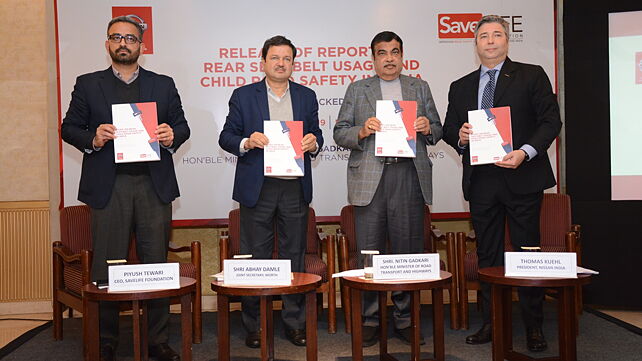
- Over 90 per cent Indians reported not using a rear seat-belt
- Report reveals only 27.7 per cent of respondents were aware that rear seat-belt usage is already mandated under the current law in India
- Only 20.1 per cent respondents owned a child helmet
The latest research report by Nissan India and SaveLIFE Foundation reveals a startling number of Indians compromising on their and their childrens’ safety. The study titled ‘Rear Seat-Belt Usage and Child Road Safety in India’ found that over 90 per cent of the respondents reported not using a rear seat-belt. The findings were released by Nitin Gadkari, Hon’ble Union Minister for Road Transport and Highways.
The findings were further confirmed through an observational survey that was conducted across strategic locations in Delhi, Mumbai, Bengaluru, Jaipur, Kolkata and Lucknow, which revealed that 98 per cent respondents were not using a rear-seat belt. Usage of rear seat-belts is very low despite over 70 percent of people affirming to the presence of rear seat-belts. The study also focused on the safety of children during commute and revealed that two-thirds of respondents believed that Indian roads are unsafe for children. The report further revealed that despite 92.8 per cent respondents reported being aware of the safety benefits of child helmets, only 20.1 per cent respondents owned a child helmet. This data is supported by the data released by the Ministry of Road Transport and Highways (MoRTH), which reveals 9,408 children lost their lives to road crashes in the year 2017 alone. This translates to nearly 26 child deaths on Indian roads every day.
The report builds a strong case for a comprehensive national Road Safety law, or the passage of Motor Vehicles Amendment Bill to bridge the policy-implementation gap and build a robust enforcement mechanism for better compliance. The need for both, better policy awareness and implementation, is evident in the report’s findings; only 27.7 percent of respondents were aware that rear seat-belt usage is already mandated under the current law in India.
Speaking on the occasion, Nitin Gadkari said, "As India continues on its trajectory of rapid infrastructure growth, the role of road safety acquires immense importance. Through a combination of policy and awareness creation measures, the government has given road safety the critical importance it deserves. I would like to laud this initiative, and the willingness of corporate India and civil society to work together to make road safety a people's movement."
Adding to this, Thomas Kuehl, President, Nissan India Operations, said, “While there have been various initiatives undertaken to raise awareness around road safety in India, the importance of wearing rear seat belts has been completely neglected. At Nissan, it is our vision to enrich people’s lives and through this initiative, we aim to raise awareness around the usage of rear seat belts. Our strategic partnership with SaveLIFE Foundation and SHARP will set a strong base to bring attention towards this important issue. The first phase of our campaign will focus on reaching out and educating over 200k children in 240 schools across 12 cities on the usage of rear seat belts and road safety.”

































